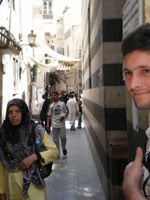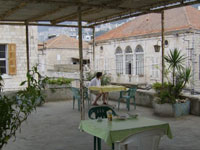 With great confidence, I strode purposefully to the counter of the patisserie and said, “Ithnaan al-qahwa min fa…” The young man working behind the counter raised his hands in front of him in a gesture that was both pleading and placating and, with very little trace of accent, said, “Please. Please stop. I speak English.”
With great confidence, I strode purposefully to the counter of the patisserie and said, “Ithnaan al-qahwa min fa…” The young man working behind the counter raised his hands in front of him in a gesture that was both pleading and placating and, with very little trace of accent, said, “Please. Please stop. I speak English.”
Welcome to the first morning of my first day in Lebanon in the summer of 2009. Suddenly I was facing the prospect of having to travel around Lebanon equipped with Arabic skills that were not nearly as good as I had thought.
By the end of my month-long backpacking trip, which also included time in Syria, my spoken Arabic vastly improved from my fateful coffee-ordering experience - in fact, it improved more in the short time I was in the two countries then it had over the entire 2 ½-year period that I had taken academic language classes.
It wasn’t only my language abilities that improved. I gained an important insight about the difference between reading about a culture in books and actually experiencing it: being an armchair adventurer doesn’t come close to the real thing.
The conversations, the sights, the smells, the food (my God, the food), the heat (my God, the heat), all came together and provided an awareness and intellectual maturity that can never be replicated in a classroom setting.
 I believe that cultural exchange and experience is one of the most important parts of an education. Sure I had learned about the Lebanese Civil War from a professor who was herself from Lebanon, but how can that compare to hearing the combination of mournfulness and passion in the voice of one of my companions in the Beqaa Valley as he talked about the Civil War and the problem of ideology and sectarianism, or to seeing the still-evident destruction from the 2006 war with my own eyes? How can learning about Lebanese culture from books compare to being taken along to experience a Shi’a wedding in the small town of Qab Elias in the Beqaa?
I believe that cultural exchange and experience is one of the most important parts of an education. Sure I had learned about the Lebanese Civil War from a professor who was herself from Lebanon, but how can that compare to hearing the combination of mournfulness and passion in the voice of one of my companions in the Beqaa Valley as he talked about the Civil War and the problem of ideology and sectarianism, or to seeing the still-evident destruction from the 2006 war with my own eyes? How can learning about Lebanese culture from books compare to being taken along to experience a Shi’a wedding in the small town of Qab Elias in the Beqaa?
What my own experience taught me is that, simply put, it can’t. This is why academic and cultural exchange programs are so crucial. What you learn outside the classroom can be as important as what you learn in the classroom. While my foreign language and history classes gave me the educational foundation and inspiration I needed to travel, I believe the best way to learn a language and a culture is through immersion. It can break down the subtle preconceptions that you don’t even realize you have about things you learn about, and add an invaluable richness and context to your knowledge of places and people. The danger of cultural assumptions is that they can worm their way into your psyche so deeply that they become almost instinctive assumptions.
With that in mind, I’d like to briefly recount one experience I had a wedding in Qab Elias, which dashed two assumptions I carried about Muslim and Arab culture.
The wedding I attended was for my professor’s female cousin, who was from Qab Elias and happened to be there when I was in Lebanon. Before the wedding, I expressed some anxiety that I was woefully underdressed in a short-sleeve button-down, shorts, and sandals. I was told not to worry, since none of the uncles and male relatives were getting dressed up - they were angry about having to go to the wedding. When I asked if it was because it was the cousin’s second marriage, my professor laughed and said “No. It’s because there won’t be any alcohol.”
Out the window went the simple equation in my head that Muslim ≠ Alcohol. My own quiet surprise that the bride’s family members appeared to be more upset over the lack of alcohol than they were about the fact of the second marriage alerted me to an assumption I wasn’t even aware I had been making. I had unconsciously fallen into the trap of treating a diverse culture as a single, definable thing and not seeing that cultures are made up of individuals - people with their own opinions and personal beliefs. Luckily for me, that presumption received a well-deserved thrashing because I was able to sit in the light of the setting sun drinking thick, dark coffee at a wedding in the beautiful Beqaa Valley. And then a few of us went to dinner and had a few drinks.
When it comes to learning about different cultures, accept no substitutes to being there.
Matt Sugrue’s professional interests are international affairs and U.S. foreign policy, with a focus on the Middle East and North Africa. He received his M.A. on the history of the Middle East and South Asia from Dalhousie University in Halifax, Nova Scotia.
